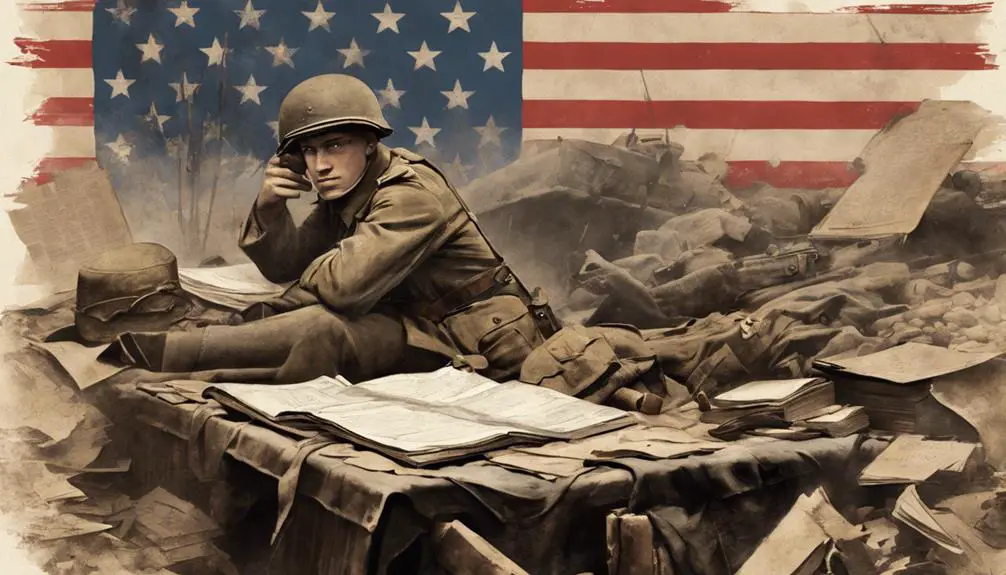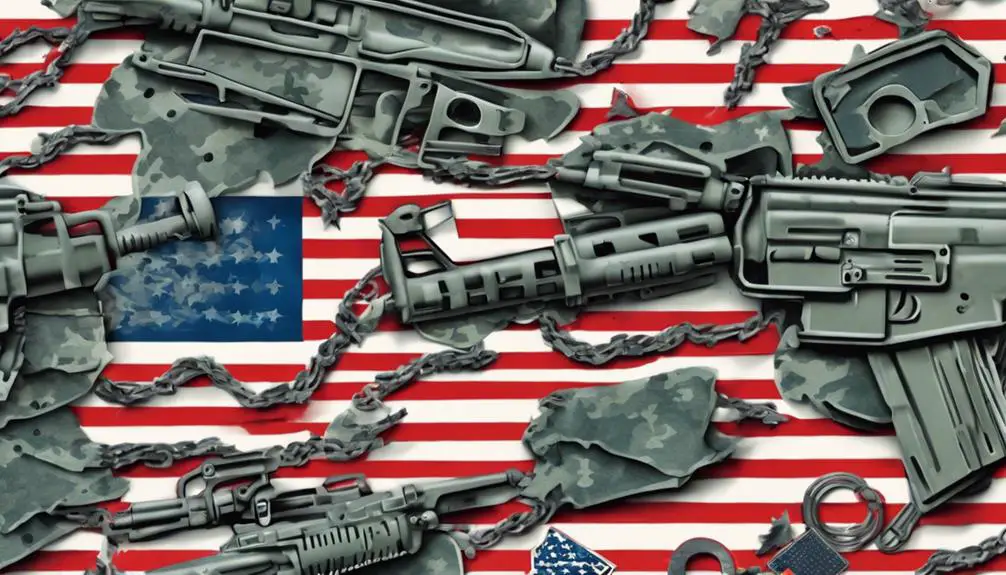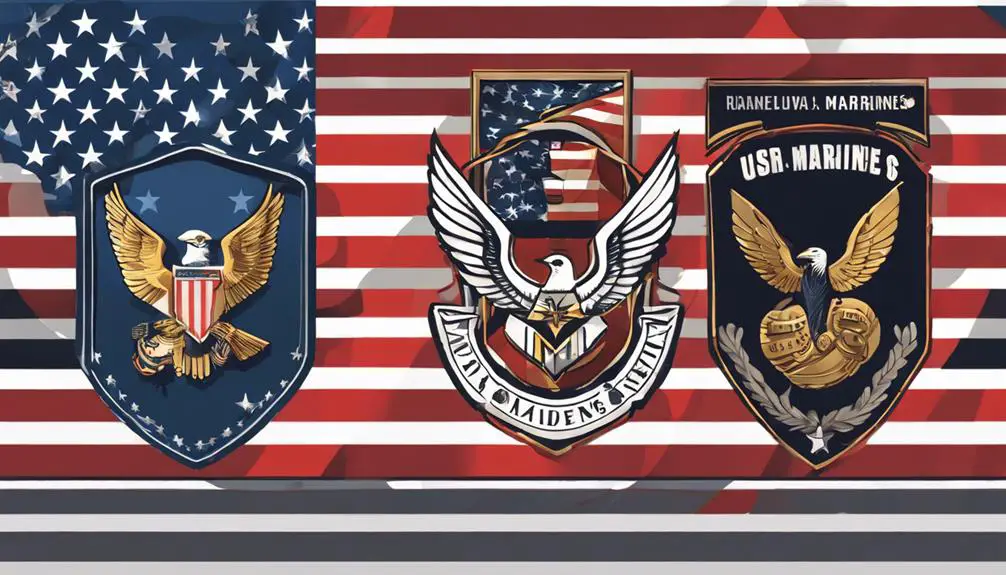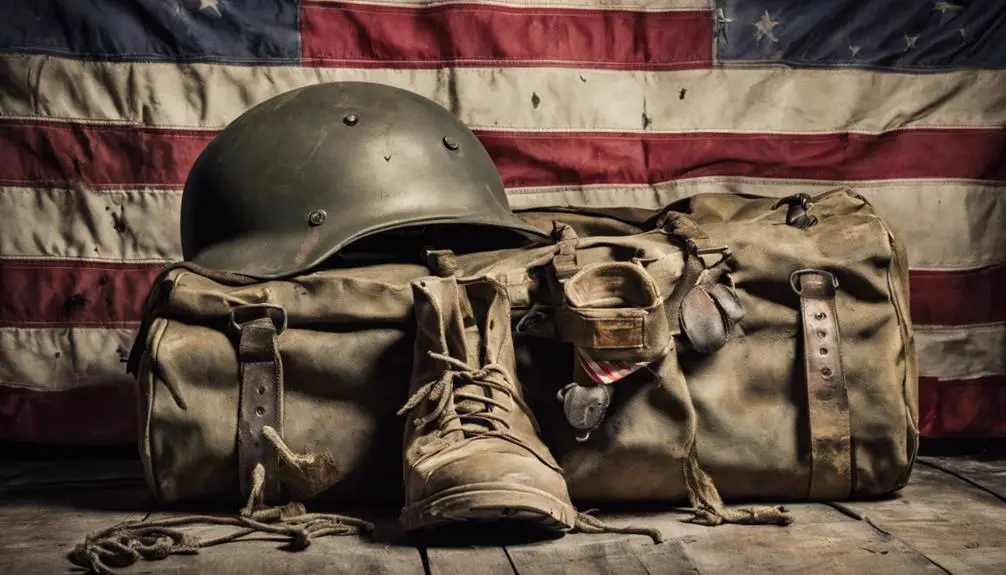You're about to enter a world where 'Hoo-ah' and 'RTO' are more than just words – they're a cultural identity, forged in the heat of battle and rooted in the history of the American military. Military slang has its roots in early American warfare, influenced by African American Vernacular English, Latin American Spanish, and Native American languages. From 'yank' and 'rebel' in the Civil War to 'Hajji' and 'COMSEC' today, each term reveals a unique cultural and historical context. As you explore American military slang, you'll uncover a complex, nuanced language that's equal parts humor, necessity, and camaraderie – and there's much more to discover.
Origins of Military Slang

As you explore the world of American military slang, you'll discover that it has a rich history. Military slang, a unique and dynamic aspect of military culture, has its roots in the earliest days of American warfare, when soldiers and sailors adapted colloquialisms and colloquial expressions to create a distinct language that served as a badge of identity and a means of communication.
This linguistic phenomenon emerged as a response to the cultural influences of the time, with African American Vernacular English, Latin American Spanish, and Native American languages all leaving their mark. The historical context of military slang is also significant, with the American Revolution, the Civil War, and World War I all contributing to its development.
You'll notice that military slang often reflects the social and cultural norms of the time, with terms like 'yank' and 'rebel' emerging during the Civil War. By examining the origins of military slang, you'll gain a deeper understanding of the complex cultural and historical forces that have shaped this unique language.
Slang in the Battlefield
On the battlefield, you're likely to hear slang terms that are born out of necessity, urgency, and the pressure to communicate quickly and effectively in high-stress situations. Here, every second counts, and clear communication is vital for success and survival. That's where battlefield banter comes in – a unique dialect that's developed to convey complex information rapidly and accurately.
Combat conversations are laced with slang terms that are often humorous, sarcastic, or ironic, serving as a coping mechanism for the extreme stress of combat. You might hear phrases like 'Hajji' to refer to enemy combatants or 'RTO' to describe a radio telephone operator. These terms aren't only efficient but also serve as a way to build camaraderie among troops.
Acronyms and Abbreviations

In the high-pressure environment of military operations, you'll encounter a plethora of acronyms and abbreviations that serve as shorthand for complex concepts, equipment, and procedures, allowing soldiers to convey critical information quickly and accurately.
As you navigate the military landscape, you'll come across FOB terminology, which stands for Forward Operating Base. This term refers to a temporary or semi-permanent military base established to support operations in a specific region.
You'll also encounter COMSEC abbreviations, which stand for Communications Security. COMSEC refers to the measures taken to protect military communications from unauthorized access or exploitation.
These abbreviations and acronyms are essential in military communication, as they enable soldiers to convey complex information efficiently. For instance, instead of saying 'Forward Operating Base,' soldiers can simply say 'FOB,' saving precious time in high-stress situations. Similarly, using COMSEC abbreviations safeguards that sensitive information remains secure and protected from potential threats.
Colloquialisms and Nicknames
You'll frequently encounter colloquialisms and nicknames in military slang, which serve as a unique form of shorthand that fosters camaraderie and expedites communication among soldiers. These colloquialisms, often referred to as "Alien Lingo," create a sense of belonging and shared experience among troops. Nicknames, or "Warrior Monikers," are also an essential part of military culture, often reflecting a soldier's personality, skills, or appearance.
Here are some examples of colloquialisms and nicknames used in the military:
| Colloquialism/Nickname | Meaning |
|---|---|
| "Hoo-ah" | Expression of excitement or agreement |
| "Oorah" | Marine Corps battle cry |
| "Slick" | New recruit or inexperienced soldier |
| "Grunt" | Infantryman or ground soldier |
| "Ranger" | Elite Army soldier trained in special operations |
These colloquialisms and nicknames are integral to the military's linguistic culture, allowing soldiers to quickly convey complex ideas and establish a sense of camaraderie in high-stress environments. By understanding these terms, you'll gain insight into the unique language and customs of the military community.
Slang Across the Branches

Each branch of the US military – Army, Navy, Air Force, Marines, and Coast Guard – has developed its unique slang, reflecting their distinct histories, cultures, and operational environments.
As you explore the diverse lexicon of the military, you'll notice that each branch has its own nuances. For instance, the Army's slang often revolves around ground operations, whereas the Navy's slang is influenced by its maritime environment. The Air Force's slang, on the other hand, is characterized by its focus on aerial combat and technology.
These branch nuances are often shaped by the unique challenges and experiences of each service. Service stereotypes also play a role in shaping the slang of each branch. For example, the Marines are often seen as the 'tip of the spear,' and their slang reflects their reputation for being bold and fearless.
Similarly, the Coast Guard's slang is influenced by its dual role as a military and law enforcement agency. By understanding the distinct slang of each branch, you'll gain insight into the unique cultures and operational environments that define the US military.
Evolution of Military Lingo
Military slang has undergone significant transformations over the years, adapting to changes in technology, tactics, and cultural norms that have reshaped the language of the armed forces.
As you explore the evolution of military lingo, you'll notice that cultural influences have played a significant role in shaping the language. For instance, during World War II, African American Vernacular English (AAVE) had a profound impact on military slang, introducing terms like 'jive' and 'dig.' Similarly, the Vietnam War saw the incorporation of Vietnamese phrases into military language.
Language barriers have also contributed to the evolution of military slang. You'll find that military personnel often adopt local phrases and adapt them to their own language, creating a unique blend of languages. This is evident in the use of Arabic phrases in modern military contexts.
As you investigate the evolution of military lingo, you'll discover how it reflects the cultural diversity and global nature of modern warfare. By examining the cultural influences and language barriers that have shaped military slang, you'll gain a deeper understanding of the complex and dynamic nature of military language.
Frequently Asked Questions
Can Military Slang Be Used in Formal Military Writing?
When you're writing in a formal military context, you'll want to maintain a professional tone. Using military slang can undermine that tone, making your writing seem informal and unprofessional.
Stick to formal language to convey your message clearly and respectfully. Avoid incorporating military jargon or colloquialisms, opting instead for standard English that effectively communicates your ideas.
Are All Military Slang Terms Universally Accepted?
When exploring the world of military slang, you'll need to take into account that not all terms are universally accepted. Regional variations and cultural differences play a significant role in shaping the language used by military personnel.
For instance, what's common in one region might be unheard of in another. Similarly, cultural nuances can influence the adoption of slang terms. You'll need to take into account these factors when communicating with military personnel from diverse backgrounds to avoid misunderstandings.
Do Military Spouses Use Military Slang?
As you navigate the world of military families, you might wonder if military spouses use military slang. The answer lies in spouse socialization and family dynamics.
When you marry into the military, you're often immersed in a new culture. You pick up on terminology and jargon through social interactions and everyday conversations with your partner.
It's likely that you'll adopt some military slang as a way to connect with your partner and feel part of the community.
Can Civilians Use Military Slang in Casual Conversation?
You might be surprised to learn that 1 in 5 Americans has a family member who's served in the military.
Now, can you use military slang in casual conversation as a civilian?
While it may seem harmless, it raises questions about cultural appropriation and social norms.
Integrating military slang into your everyday language can be viewed as informal speech, but it's crucial to take into account the context and audience to avoid unintended offense.
Is Military Slang Used in Other Countries' Armed Forces?
As you explore military slang globally, you'll find that cross-cultural adoption is a significant phenomenon. International dialects of military slang have emerged, reflecting the unique cultural and linguistic contexts of each country's armed forces.
You'll discover, for instance, that the British Army has its own distinct slang, as do the Australian and Canadian militaries. This adoption of military slang transcends national borders, highlighting the universal need for informal communication within military ranks.
Conclusion
As you reflect on the world of American military slang, remember that it's a living, breathing creature that adapts to the battlefield's ever-changing landscape.
Like a chameleon, military lingo blends in, yet stands out, revealing the complexities of war and those who fight it.
As you've seen, this unique language has evolved over time, woven from threads of necessity, camaraderie, and creativity.







